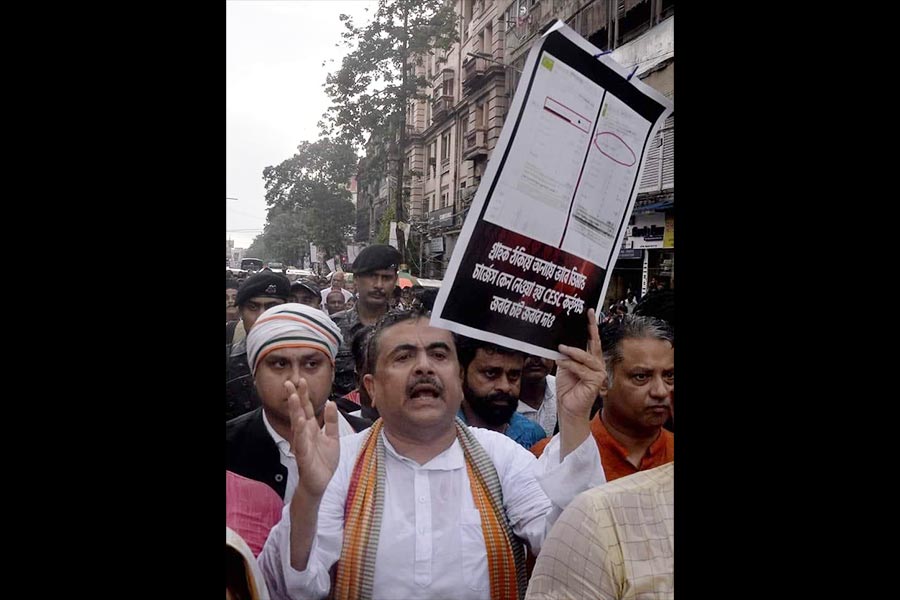Bengal Assembly Leader of Opposition Suvendu Adhikari has threatened a movement against what his party, the BJP, calls increased power tariffs if the state government does not intervene by August 15.
On Friday, Adhikari with a band of BJP leaders walked from the old party headquarters at 10, Muralidhar Sen lane to Victoria House in the heart of Calcutta demanding a rollback in power tariff, which the BJP said is burning deep holes in the pockets of the average Calcuttan .
The truth is slightly different.
While the Narendra Modi government has pushed the discoms to recover the expense of input costs such as fuel from consumers, Bengal chief minister Mamata Banerjee has refused to consider any proposal for a hike in the power tariff, leaving the power sector bereft of funds.
Earlier this month, the CM had expressed her ire against the Sanjeev Goenka-run power utility, Calcutta Electricity Supply Corporation (CESC), of levying the Fuel and Power Purchase Adjustment Surcharge (FPPAS) without informing the state government.
“It would have been better if the state had been informed about this beforehand,” she had said.
In December 2022, the Union power ministry had issued a gazette notification in Hindi and English on the Electricity (Amendment) Rules, 2022.
A key element of the amended rules was the FPPAS, which puts the onus on the distribution company to recover the expense made on purchase of fuel (like coal) and power from the consumers.
“The commission shall within 90 days of publications of these rules, specify a price adjustment formula for recovery of the costs, arising on account of the variation in the price of fuel, or power purchase costs and the impact in the cost due to such variation shall be automatically passed through in the consumer tariff, on monthly basis using this formula and such monthly automatic adjustment shall be trued up on an annual basis by the Appropriate Commission.”
The amended rules further stated: “… in case the distribution licensee fails to compute and charge fuel and power purchase adjustment surcharge within the timeline specified by the Appropriate Commission, except in case of any force majeure condition, its right for recovery of costs on account of fuel and power purchase amendment shall be forfeited…”
The rules clarified that the distribution company “may decide, fuel and power purchase adjustment surcharge or a part thereof, to be carried forward to the subsequent month in order to avoid any tariff shock to consumers, but the carry forward of the fuel surcharge shall not exceed a maximum duration of two months..”
The gazette notification was issued on December 29, 2022 but neither the CESC nor the West Bengal State Electricity Distribution Company Limited (WBSEDCL, which supplies power in Calcutta suburbs like Bidhannagar aka Salt Lake) had included the FPPAS in the bill.
After the notification was issued, the CESC started mentioning the amount in the monthly bill but did not compute it in the total amount. Since this month, the CESC has started recovering the dues under FPPAS at a rate of 5.7 per cent though the actual amount varies depending on the total units consumed.
“If the CESC had its way, then the FPPAS would come to somewhere between 25 – 28 per cent,” said a former official of the power department, who requested anonymity. “The WBSEDCL will not pass on the burden on the consumers since the government can always bail it out with financial restructuring and grant. The same does not work for CESC.”
For the 2020-21 fiscal year, the WBSEDCL had to forego Rs 3,300 crore as cost on fuel and power purchase. The following year, the amount stood at Rs 1,200 crore, according to sources in the state-run discom.
The last time that the distribution companies – state-run or private – were allowed by the West Bengal Electricity Regulatory Commission to raise the amount spent on purchase of fuel and power was in 2014 – for the WBSEDCL, while CESC continued till 2016-17.
“The chief minister is against any price hike in the power sector,” said a former top official in the state-run power utility. “Since this [December 2022] notification was from the power ministry, the CESC could not afford to ignore it altogether. If the tariff is not hiked, transmission and distribution of power in the state will be in serious trouble.”
For the WBSEDCL customers, the power tariff has remained unchanged. The state-run discom did revise the rates in the slabs, which many feel were a roundabout way of bringing about a hike without explicitly saying so.
For example earlier, for every 72 units consumed, a WBSEDCL consumer had to pay Rs 5. In the revisions which were made during the Lok Sabha polls of this year, the same amount is charged for every 32 units.
The WBSEDCL had argued that the slabs had been divided into two to calculate the energy charge, keeping the rate per unit unchanged.
The average power tariff in the CESC area is around Rs. 7.72 per unit, which is lower than that of Delhi, Mumbai, Ahmedabad and Bangalore.
The state power minister Aroop Biswas did not respond to calls made by The Telegraph Online.










